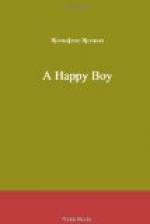“Yes; of course you may say it.”
“I care a great deal for that love of mine.”
He stood aghast for a moment, recalling a hundred similar conversations with similar results, then he shook his head, turned his back, and walked away.
He picked a quarrel with the housemen, abused the girls, beat the large dog, and almost frightened the life out of a little hen that had strayed into the field; but to Marit he said nothing.
That evening Marit was so happy when she went up-stairs to bed, that she opened the window, lay in the window-frame, looked out and sang. She had found a pretty little love-song, and it was that she sang.
“Lovest thou but
me,
I will e’er
love thee,
All my days on
earth, so fondly;
Short were summer’s
days,
Now the flower
decays,—
Comes again with
spring, so kindly.
“What you said
last year
Still rings in
my ear,
As I all alone
am sitting,
And your thoughts
do try
In my heart to
fly,—
Picture life in
sunshine flitting.
“Litli—litli—loy,
Well I hear the
boy,
Sighs behind the
birches heaving.
I am in dismay,
Thou must show
the way,
For the night
her shroud is weaving.
“Flomma, lomma,
hys,
Sang I of a kiss,
No, thou surely
art mistaken.
Didst thou hear
it, say?
Cast the thought
away;
Look on me as
one forsaken.
“Oh, good-night!
good-night!
Dreams of eyes
so bright,
Hold me now in
soft embraces,
But that wily
word,
Which thou thought’st
unheard,
Leaves in me of
love no traces.
“I my window close,
But in sweet repose
Songs from thee
I hear returning;
Calling me they
smile,
And my thoughts
beguile,—
Must I e’er
for thee be yearning?”
CHAPTER XII.
Several years have passed since the last scene.
It is well on in the autumn. The school-master comes walking up to Nordistuen, opens the outer door, finds no one at home, opens another, finds no one at home; and thus he keeps on until he reaches the innermost room in the long building. There Ole Nordistuen is sitting alone, by the side of his bed, his eyes fixed on his hands.
The school-master salutes him, and receives a greeting in return; he finds a stool, and seats himself in front of Ole.
“You have sent for me,” he says.
“I have.”
The school-master takes a fresh quid of tobacco, glances around the room, picks up a book that is lying on the bench, and turns over the leaves.
“What did you want of me?”
“I was just sitting here thinking it over.”
The school-master gives himself plenty of time, searches for his spectacles in order to read the title of the book, wipes them and puts them on.




